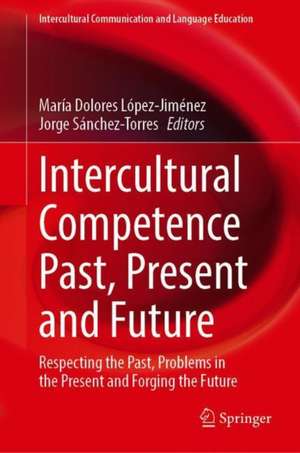Intercultural Competence Past, Present and Future: Respecting the Past, Problems in the Present and Forging the Future: Intercultural Communication and Language Education
Editat de María Dolores López-Jiménez, Jorge Sánchez-Torresen Limba Engleză Hardback – 9 ian 2021
| Toate formatele și edițiile | Preț | Express |
|---|---|---|
| Paperback (1) | 889.75 lei 6-8 săpt. | |
| Springer Nature Singapore – 9 ian 2022 | 889.75 lei 6-8 săpt. | |
| Hardback (1) | 895.76 lei 6-8 săpt. | |
| Springer Nature Singapore – 9 ian 2021 | 895.76 lei 6-8 săpt. |
Preț: 895.76 lei
Preț vechi: 1092.39 lei
-18% Nou
Puncte Express: 1344
Preț estimativ în valută:
171.43€ • 178.31$ • 141.52£
171.43€ • 178.31$ • 141.52£
Carte tipărită la comandă
Livrare economică 15-29 aprilie
Preluare comenzi: 021 569.72.76
Specificații
ISBN-13: 9789811582448
ISBN-10: 9811582440
Ilustrații: VI, 280 p. 2 illus.
Dimensiuni: 155 x 235 mm
Greutate: 0.58 kg
Ediția:1st ed. 2021
Editura: Springer Nature Singapore
Colecția Springer
Seria Intercultural Communication and Language Education
Locul publicării:Singapore, Singapore
ISBN-10: 9811582440
Ilustrații: VI, 280 p. 2 illus.
Dimensiuni: 155 x 235 mm
Greutate: 0.58 kg
Ediția:1st ed. 2021
Editura: Springer Nature Singapore
Colecția Springer
Seria Intercultural Communication and Language Education
Locul publicării:Singapore, Singapore
Cuprins
Introduction and Overview.- Part 1: Respecting the past and problems in the present.- 1. Language learning motivation and interculturality of Australian community/heritage language learners.- 2. Intermittent second-language intensification in the host culture: an ethnographic case study of a heritage speaker in a study-abroad program.- 3. Problems for teachers of culturally diverse classes: investigating strategies and activities to embed intercultural metalanguage in an Australian “internationalized” university context.- 4. Exploring the relationship between teacher confirmation and student motivation: the United States and Finland.- 5. Intercultural barriers to feedback in study abroad settings.- 6. Intercultural language teaching: on reflection.- Part 2: Forging the future.- 7. Attitudes towards English as a lingua franca amongst prospective EFL teachers in Spain.- 8. How critical has intercultural learning and teaching become? A diachronic and synchronic view of “critical culturalawareness” in language Education.- 9. Building an online community to contest stereotyping and otherization during study abroad.- 10. Promoting intercultural and visual media competence in the foreign language classroom with the autobiography of intercultural encounters through visual media.- 11. Intercultural competence and parsnip: voices from teachers of English in Australia.
Notă biografică
María Dolores López-Jiménez holds a BA in English Philology (1995) from the University of Seville, Seville, Spain, an MA in Spanish Applied Linguistics (2000) and an MA in English Applied Linguistics (2001) from Indiana University, Indiana, USA and a PhD (2009) in Second Language Teaching and Acquisition from the University of Seville, Seville, Spain. She is a member of the University of Seville Research Group La lengua inglesa en el ámbito universitario (PAI: HUM 397). She worked as a Teaching Assistant at the Department of Spanish and Portuguese at Indiana University from 1998-2001. She is currently an assistant professor at the Department of Philology and Translation at Universidad Pablo de Olavide, Seville, Spain. She has been teaching courses on sociocultural aspects of the English world for more than ten years. Her main areas of research include second language teaching and learning, (inter)cultural aspects and English as a foreign language and Spanish as a second languagematerials evaluation.
Jorge Sánchez Torres holds a degree in English Philology as a Diploma of Advanced Studies in Applied Linguistics, and a PhD on Second Language Acquisition (2014) from University of Seville. He is a member of the University of Seville research group La Lengua Inglesa en el Ámbito Universitario (PAI: HUM397). He is teaching Professional Teaching Development, Second Language Teaching / Learning Methodology and Pedagogy, English courses and Spanish for specific purposes in various institutions such as Centro Internacional de Estudios Culturales (CINECU)and The Center for Cross-Cultural Studies, Seville, Spain. He is an Adjunt Lecturer for University of North Carolina and North Carolina State University at CINECU, Seville, Spain. He has worked as a Professor at the University of North Carolina (Romance Languages Department), the University of Seville (Department of English Philology, English Language) and in different institutions, in Seville, asa bilingual teacher with children aged between 2 and 14 years of age. His current research interests include second language teaching / learning methodology and pedagogy, bilingualism, bilingual families and bilingual education, family language policy, instructional technologies, team-teaching, interculturality and intercultural communicative competence.
Textul de pe ultima copertă
This book explores the benefits of teaching reflection upon one’s own culture to develop intercultural competence and looks into the relationship between the proficiency level of the second language and the target culture. It introduces new debates on the concept of ‘critical cultural awareness’ in intercultural learning and teaching, for example the indiscriminate use of terminologies related to the idea of ‘intercultural encounters’. Also, it provides insight into the relationship between language and culture using a new tool such as the Autobiography of Intercultural Encounters through Visual Media. The presentation of different approaches, tools, barriers, educational and cultural realities, online intercultural exchange projects and concepts such as motivation, attitudes, stereotyping, otherization, and critical cultural awareness makes this book an excellent instrument not only for teachers but also for researchers, policy-makers and private and public institutions that want to explore culture and interculturality and to promote an intercultural competence and global citizenship among its learners / users / clients and / or an interculturally-oriented language education.
Caracteristici
Explores the benefits of teaching reflection upon one’s own culture to develop intercultural competence Sheds light on teacher’s feedback and students’ cultural differences and expectations Shows the closeness between language learning motivation and interculturality







